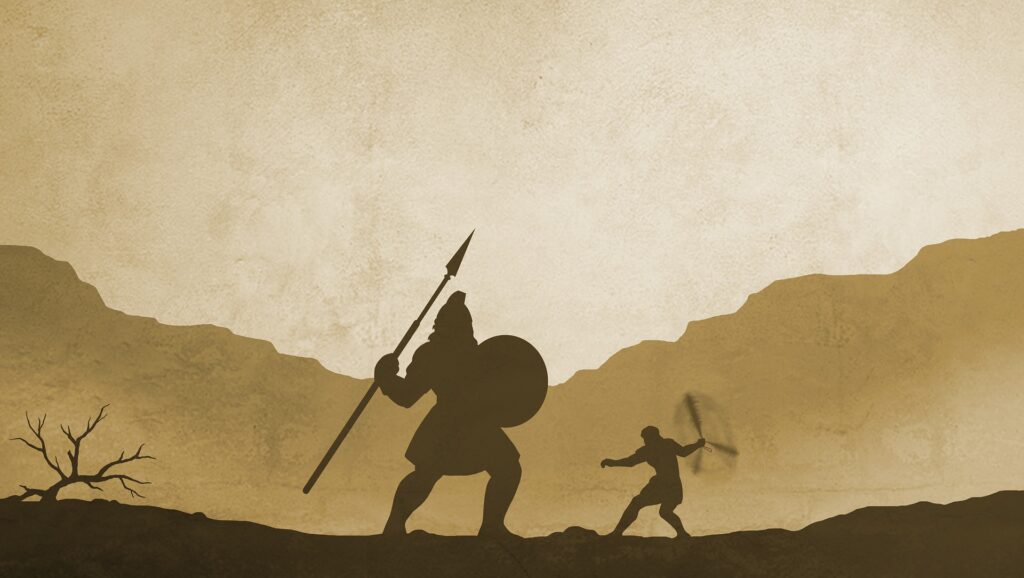King David’s Puberty
What image comes to mind when you think of teens? Puberty? Mood swings? But guess what? Just over 100 years ago, puberty was a pretty nebulous concept, and it wasn’t until the1920s and 30s that the word ‘teenager’ was first used in the U.S. Before that, there were only twogenerational distinctions in traditional societies: children and adults, and by the time children turned 15to 18, they were already treated as adults and got married. In that sense, adolescence and puberty can be understood as a social phenomenon and a social conceptthat arises from the delayed social acceptance of adulthood. In the Bible, there are several stories of great people who were used by God during their adolescence.David was probably around 14 or 15 years old when he defeated Goliath (1 Samuel 17). Esther was ayoung, beautiful queen who became queen as a teenager, and then when Haman tried to wipe out theJews, Esther was about 20 years old when she risked her life to go before the king and save the nation(Esther 4). Daniel, on the other hand, was probably around 18 when he and his three friends decided notto eat food sacrificed to idols (Daniel 10). There is one common trait that all of these people have in common: they were simple, almost ignorant,and brave enough to put their lives on the line for what they believed was right. Adolescence is a timewhen the simplicity and innocence of a child coexists with the emotional and physical capabilities of anadult, which is why teens like to argue and are often unwilling to move a finger unless they areunderstood, but they also want to be part something important and have a very strong sense of justiceabout what is happening around them. Take a look at David when he faced Goliath (1 Samuel 17). From a modern adult perspective, he shows asomewhat excessive sense of justice, arguing with his elder brothers about risking their lives for thejustice of God. Would it make more sense if I told you that David was in the midst of puberty at the time?He had that burning sense of righteousness that is often found in teenagers of that age, and when giventhe opportunity, he throws the sling that he used to chase beasts and takes down the invincible giant. Hisbrothers look down on him, but God gives him the opportunity to use his burning sense of justice in agreat way. I would like to share with you the life story of Dr. Wess Stafford, the former president of CompassionInternational (Christian humanitarian aid organization). As the son of missionaries from the U.S. to theIvory Coast. Wess grew up in one of the remote villages of Africa. His own family as the only whitepeople around, young Wess grew up speaking the local language, going to the local school, hanging outwith local friends, being cared for by local adults in the village, and being a thoroughly integratedmember of the local community. His only prayer at the time was, “Dear Lord, when I wake up tomorrowmorning, please let my skin be darker.” Reflecting on his childhood, he notes that in the African agricultural society he belonged to, children andteenagers were entrusted with tasks that were important to be performed by adults. Teenagers wouldsow seeds with the adults, fetch water, and look after their younger siblings just like adults. TeenagerWess and his African friends had to guard the cornfields at night to keep wild monkeys out from stealingcorn, throwing stones to chase them away. This task was very important to keep the community aliveand fed. In Wess’ experience, teenagers in such societies do not undergo puberty like we do. Instead, childrenand teenagers naturally grow up learning and performing adult tasks. They are entrusted with significantresponsibilities within the local community, which helps them develop a strong sense of belonging andleaves no room for delinquency. As a teenager in a remote African village, Wess recalls having highself-esteem when reading the story of David defeating Goliath in the Bible, thinking to himself, “That’ssomething I can do too!” Quite fascinating, isn’t it? The modern world, however, does not offer such “important” tasks and opportunities to teenagers. Athome, in church, or schools, teenagers are often viewed as passive learners, subject to adult supervisiondue to concerns about potential misbehavior. This reality of ours can be traced back to the IndustrialRevolution of the 19th century, which created a distinct separation between adult and child throughwork and formal education. This reality of ours persists even today.What can we do about it? One simple, and yet highly effective solution is to provide teenagers with opportunities to undertakesignificant responsibilities within our community. We need to avoid the stereotype that our children aretoo young for any significant responsibilities. Rather, we must acknowledge that, given the appropriateopportunity, they possess the capability to surrender their lives to the Lord and their community. Here are some real-life examples: Instead of parents feeding our children, we can give our teenagersopportunities and train them to feed their younger siblings. Instead of just having them study the Bible,how about giving them opportunities to teach the Bible to their friends and younger siblings. Instead ofjust studying hard on their own, how about encouraging them to help their younger siblings with theirhomework and reach out to their classmates who are struggling to learn. “We grow when we help othersgrow,” is one of the mottos of the 4/14 movement, a movement that seeks to reach children ages 4 to 14with the gospel and empower them to become disciple-makers themselves. It’s hard to grow whenyou’re always in the position of a taker, but it’s easy to grow when you’re living the life of a giver. It is essential to create opportunities for our teenagers to give, not just receive. In our household, weintentionally train older siblings to care for younger siblings, which is necessary given the number ofchildren and household responsibilities that come with it. Older siblings are tasked with preparing andadministering formula when younger siblings are distressed, assisting parents with bathing

